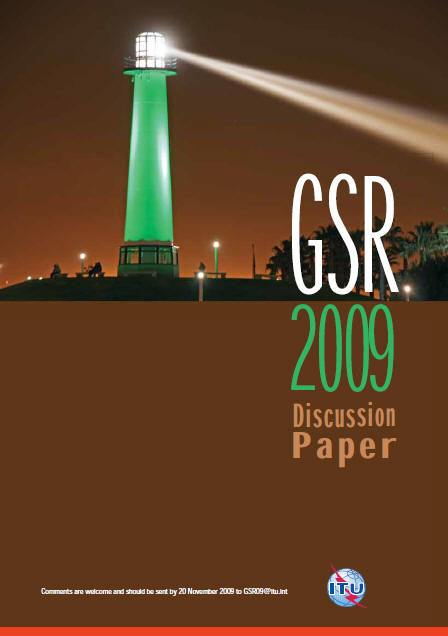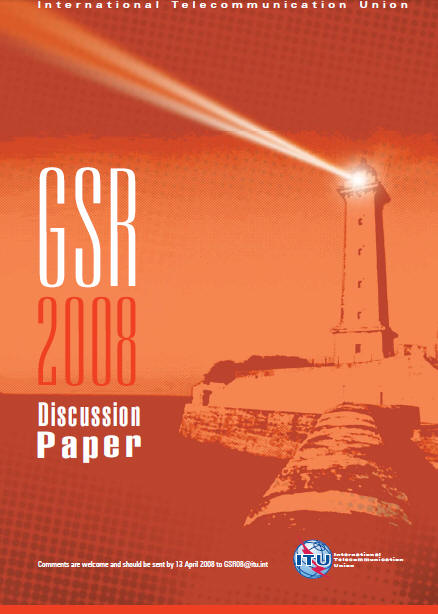| |
-
Coming soon: ITU Study on
Taxing telecommunications/ICT services: an overview
General and special taxes on
telecommunication/ICT services are not the only direct or indirect
interaction between the finance ministry and telecommunications/ICT
operators. In addition, customs taxes on telecommunication
equipment or devices have an impact. This paper contains a general, introductory discussion of the effects of
imposing special taxes on telecommunications/ICT equipment and services in
addition to the general run of taxes, such as VAT, which apply to most or
all goods and services. Edition 2012.
|
| |
|
| |
-
 Strategies for the deployment of NGN and NGA in a broadband environment
– regulatory and economic aspects
Strategies for the deployment of NGN and NGA in a broadband environment
– regulatory and economic aspects
This report identifies the key issues
in NGN and NGA migration as well as the benefits from the change. This
indicates that moving to a broadband based economy has wider benefits –
far beyond the telecoms industry. The movement to NGN in emerging
economies has to face other
problems, not seen in the developed economies that have generally been
the ones to implement broadband. It provides a number of proposals that
can assist with the development of strategies for NGN deployment.
Although any such deployment has some risks, these can be countered with
the question of: what are the risks to the economy and national
competitiveness if there is no NGN investment and peer countries do make
the transition.
|
| |
-
 Regulating broadband prices Regulating broadband prices
This publication is part of the ITU Broadband Series. The affordability and accessibility of
broadband services are largely determined by the prices that are charged for
those services. The regulation of prices could thus be a very tempting
prospect for policymakers and regulators who want to increase the adoption
and use of broadband services at the earliest time. However, price
intervention in broadband markets could be a risky proposition and
potentially damaging to the long-term development of those markets. Edition
2012.
|
| |
-
The impact of broadband on the economy
This publication is part of
the ITU Broadband Series. The diffusion of broadband, defined as the
technology that enables high-speed transfer of data, is inextricably
linked to the emergence of the Internet. With the amounts of
capital being invested in the technology, it is natural that policy
makers and researchers in the social sciences have begun to analyze the
economic and social impact of broadband. In fact, social scientists and
policy makers had been researching the economic contribution of
information and communication technologies for quite a while.
Edition 2012.
|
| |
-
Guidelines for the
Application of Statistical Models to Telecommunication Market Regulation
These guidelines discuss the application of statistical tools in
specific situations related to telecommunication market regulation.
The science of statistics is today an effective means of accurately
describing the values of economic, political and social data.
thus, an expert in the use of statistical tools is able to interpret
results fro the benefit of the company, the government and society and
thereby facilitate decision-making, and to infer the future behavior of
events similar to those analyzed. Edition 2011.
|
| |
-
 Mobile Termination Rates: To Regulate or not To Regulate Mobile Termination Rates: To Regulate or not To Regulate
Over past few years mobile termination charges — the charges that mobile
operators levy on each other and on fixed network operators for terminating
calls on their networks — have become a concern in many countries throughout
the world. The main aim of this paper is to analyze the development of
MTR regulation in the different regions of the world and to evaluate the
necessity and the scope of such regulation. Edition 2010.
|
| |
-
Developments of Next Generation
Networks (NGN): Country Case
Studies
The move to Next
Generation Networks (NGN) has been discussed in the ICT community for
some time. Not only discussed. Developments in the market reflect the
move, where a number of market players around the world are already
operating NGN core networks, increasing numbers of market players are
deploying NGN access, and others have made significant commitments to
roll out fibre access networks (FTTx) or have migration plans for moving
to all-IP networks.
The aim of this document is to present the current
situation of NGN development in different regions of the world and to
examine what effect the transition towards NGNs is having on regulation.
Edition 2010.
|
| |
-
 International Mobile Roaming Regulation – An incentive for cooperation International Mobile Roaming Regulation – An incentive for cooperation
This paper addresses a variety
of issues raised by international mobile roaming charges: how do they differ
from charges for non-roaming international mobile calls (i.e. when a mobile
subscriber calls an international number from its home country); what is the
structure of their costs; is there a need for regulatory intervention and,
if so, how could they be regulated; and finally, is cooperation and
coordination on international mobile roaming regulation beneficial?
|
| |
-
Regulatory
Accounting Guide
This guide focuses on the implementation of
cost accounting models and the development of regulatory policies, based on
best practices, to help National Regulatory Authorities (NRAs) implement a
regulatory accounting model. It also provides a methodology to identify
markets, Significant Market Power (SMP) operators and the different
typologies of anticompetitive behavior.
|
| |
-
 Trends
in Economics and Finance: The Use of Economic Modeling in Telecommunications Trends
in Economics and Finance: The Use of Economic Modeling in Telecommunications
In the telecommunication industry, economic modeling techniques such as
regression analysis, simulations and linear programming are powerful tools that
can aid decision making for governments, regulatory authorities and
telecommunication operators. The aim of this report on Trends in
Economics and finance is to describe
the various economic modeling techniques and how they can be used to solve
practical problems facing the telecommunication industry. Edition 2006.
|
| |
-
Efficient Operator: Methodologies, modeling and application for tariff
regulation
Regulation is
not the ideal way to encourage market competition. It is always
preferable to encourage market competition. However, there are “market
failures” when the market is not perfectly efficient in allocating
resources, leading to suboptimal distribution among the population.
Therefore, the aim of any market regulation should be to replicate what
happens in a market under conditions of perfect competition.
This study sets forth and analyses the methodologies
for fixing tariffs used in the modeling of an efficient operator, focusing
on the advantages and disadvantages and looking at the results of a number
of recent applications in Chile, Venezuela and Colombia.
|
| |
-
 Investing
in telecommunications and ICTs in Developing Markets: Shifting the Paradigm Investing
in telecommunications and ICTs in Developing Markets: Shifting the Paradigm
The purpose of this report is to contribute to the discussion on how to enhance
the proliferation of telecommunications and ICTs, particularly in developing
countries, in a way that promotes the achievement of the Millennium Development
Goals. The major focus of this report is to provide insight into how to
stimulate direct investment in telecommunications and ICTs in developing
countries.
Edition 2004.
|
| |
-
Broadband Telecommunications in Latin America
Technologies and broadband
services today acquire a key role in regional development, modernization
of all economic activities and social and evolution towards the
information society and digital economy. This report was compiled and
analyze the status of programs, actions, recommendations and solutions
for access technologies and broadband services. This is available only in Spanish.
|
| |
|
| |
-
Study on the application of cost
models in Latin American and Caribbean countries
This study is a complete assessment of
the situation in each Latin American and Caribbean countries with
regards with the application of cost modeling for the calculation of
cost of the different telecommunications/ICT services. It also
describes the importance of modeling and the different costing
methodologies applied by the LAC administrations.
|
|
|
-
 Reports
on Market Liberalization for CEE countries and Baltic States Reports
on Market Liberalization for CEE countries and Baltic States
This
report is on the theoretical and practical aspects of significant market power
in telecommunications. Telecommunications markets throughout the world economy
are characterized by a high level of economic and technological
dynamics. The latter can be partly attributed to digitization, which has
led to a convergence of previously existing markets, such as cable TV,
fixed-line telecommunications and broadcasting. Modern digital
technologies have created larger markets in which data, voice, video and
audio are transmitted in the form of compressed digital signals.
|
| |
-
Study on IP-based networks: Pricing of telecommunication services
This study is concerned with pricing
and different categories of quality of service over IP networks, with a
view to the provision of real-time IP services. In providing information
about this topic the report also analyses several academic studies
(supplied by the ITU) in terms of their contribution to the topic, and
explains the business case for international bypass offered by IP
networks.
|
| |
-
Results from the regional assessment of the telecommunication market
in Latin America and the Caribbean
This study had been implemented in the
framework of the Agenda for Connectivity in the Americas. This
document undertakes the issue of the ICT's development in countries of
LA&C, with reference to their level of economic activities such as
capital flows, unemployment, income distribution and poverty, and on the
economic side, their investments in the telecommunications sector and
infrastructure of communications, on the other hand. The work also
analyzes recent progress on ICTs’ regional development, the situation in
rural areas and the infrastructure for the main telecom services in the
region. The relationship between ICTs and education, economy and
technology are also part of the analysis.
|
| |
-
Economic Study for Financing Telecommunication Development
The ITU is
committed to assist its Member States, especially Less Developed Countries (LDC),
in creating an atmosphere for investment; and to facilitating the marriage
between potential investors and recipients. In particular, the ITU/BDT is tasked
with analyzing and fostering these relationships, and this paper is intended to
serve both Member States and investors in creating the means for
telecommunication development.
Edition 2003.
|
| |
|



